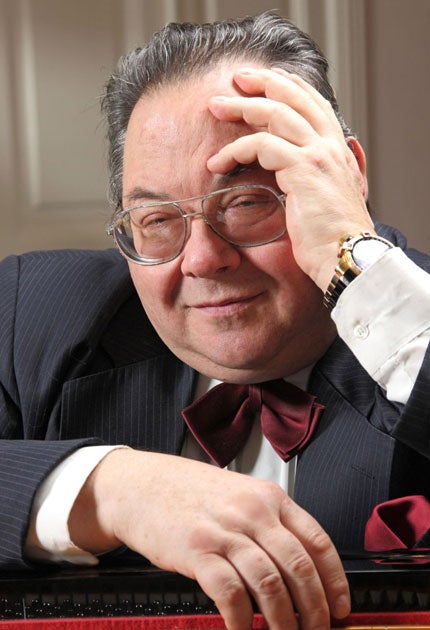Nikolai Petrov: Pianist renowned for his powerful technique and massive repertoire

Your support helps us to tell the story
From reproductive rights to climate change to Big Tech, The Independent is on the ground when the story is developing. Whether it's investigating the financials of Elon Musk's pro-Trump PAC or producing our latest documentary, 'The A Word', which shines a light on the American women fighting for reproductive rights, we know how important it is to parse out the facts from the messaging.
At such a critical moment in US history, we need reporters on the ground. Your donation allows us to keep sending journalists to speak to both sides of the story.
The Independent is trusted by Americans across the entire political spectrum. And unlike many other quality news outlets, we choose not to lock Americans out of our reporting and analysis with paywalls. We believe quality journalism should be available to everyone, paid for by those who can afford it.
Your support makes all the difference.Nikolai Petrov was one of the giants of Russian pianism, a musician with a colossal technique and a matching appetite for hard work. Paradoxically, though he was one of the handful of Soviet artists allowed to travel abroad during the height of the Cold War, he didn't enjoy the reputation in the west of some of his compatriots, not least because he didn't have a recording contract from a major label. But at home he was a star. And when the Soviet Union collapsed, Petrov had lots of opportunities to emigrate, according to his younger colleague and compatriot Denis Matsuev, "but his heart was here and it ached for what was happening in the country".
Petrov was held in high esteem by other pianists. For the Paris-based Edouard Oganessian, who trained in Moscow when Petrov was in his prime, he was: "a great musician, very demanding of himself and with refined taste. He had a straightforward and lucid personality, and a very powerful technique, one of the finest there was, which could encompass the entire musical universe."
The British pianist Jonathan Powell, a specialist in Russian repertoire, felt that: "Petrov's huge tonal range encompassed immense power and filigree delicacy, and he could switch between these instantly. Like that of his teacher Yakov Zak, his playing also had an emotional directness that could communicate music's essence and which he did not use as a vehicle for himself."
Petrov was born into a musical family: his father was the cellist Arnold Ferkelman and his grandfather the operatic bass Vasily Petrov, whose name he took. Petrov began piano lessons with his grandmother at the age of three and then attended the central music school of the Moscow Conservatory – an institution to which he was to remain loyal all his life – where his principal teacher was Tatiana Kestner. Entering the Conservatory itself in 1961, Petrov spent six years under the tutelage of Yakov Zak.
His rise to international prominence began in 1962, at the age of 19, when he won the silver medal of the Van Cliburn international piano competition in Texas. Two years later he again attracted attention by taking the silver medal of the Queen Elisabeth competition in Brussels (the first prize going to another Zak student, Evgeny Mogilevsky). Petrov was to return to the Van Cliburn competition as a juror in 1977.
Over the next 35 years, Petrov maintained a demanding schedule of between 70 and 100 concerts a year. Many of them were given in the Great Hall of the Moscow Conservatory, where he held a professorship and, from 1996, presented a recital series called simply "Nikolai Petrov Plays", which usually sold out. His concerto performances were given with conductors of the calibre of Valery Gergiev, Kirill Kondrashin, Gennady Rozhdestvensky, Evgeny Svetlanov and Yuri Termirkanov.
Petrov was accorded an unusual degree of liberty by the Soviet authorities to travel abroad and appeared with many of the major orchestras, among them the Berlin Philharmonic, London Symphony, Los Angeles Philharmonic, National Symphony and Royal Philharmonic. In Britain he played in the Barbican and the Royal Festival and Royal Albert Halls; New York saw him in the Carnegie Hall, Amsterdam in the Concertgebouw and Buenos Aires in the Teatro Colón.
Petrov's recordings, mainly on the Russian label Melodiya, which give only an indication of his huge repertoire, obviously included music by Russian composers, not least Mussorgsky, Prokofiev, Rachmaninov and Scriabin, and such moderate modernists as Eshpai, Kapustin, Khrennikov and Shchedrin. Among the classics he recorded Bach, Brahms, Chopin, Debussy, Handel, Liszt, Mendelssohn, Mozart and Saint-Saëns.
Petrov, a big bear of a man, was not someone to rest on his laurels: in 1998 he set up the Nikolai Petrov international foundation to help promote the careers of promising young Russian musicians, and in 2000 he founded a duo with the pianist Alexander Gindin, expanding his already massive repertoire with that for two pianos and piano four hands and notching up over a hundred concerts with Gindin. He served on the jury of the Tchaikovsky competition in Moscow in 2007.
He was on the road, touring in Belarus, in May when he had a massive stroke and had been hospitalised ever since. Shortly beforehand he had given an interview in which he confessed: "I'm happy. I managed to make my life in a way I wanted it to be made".
Nikolai Arnoldovich Petrov, pianist: born Moscow 14 April 1943; married (one daughter); died Moscow 3 August 2011.
Join our commenting forum
Join thought-provoking conversations, follow other Independent readers and see their replies
Comments